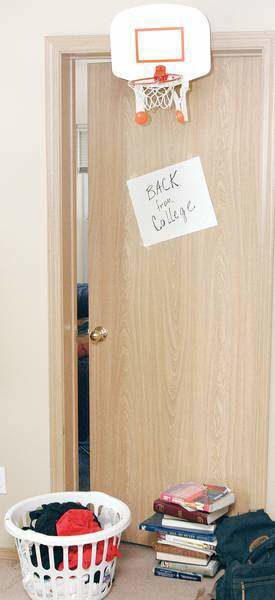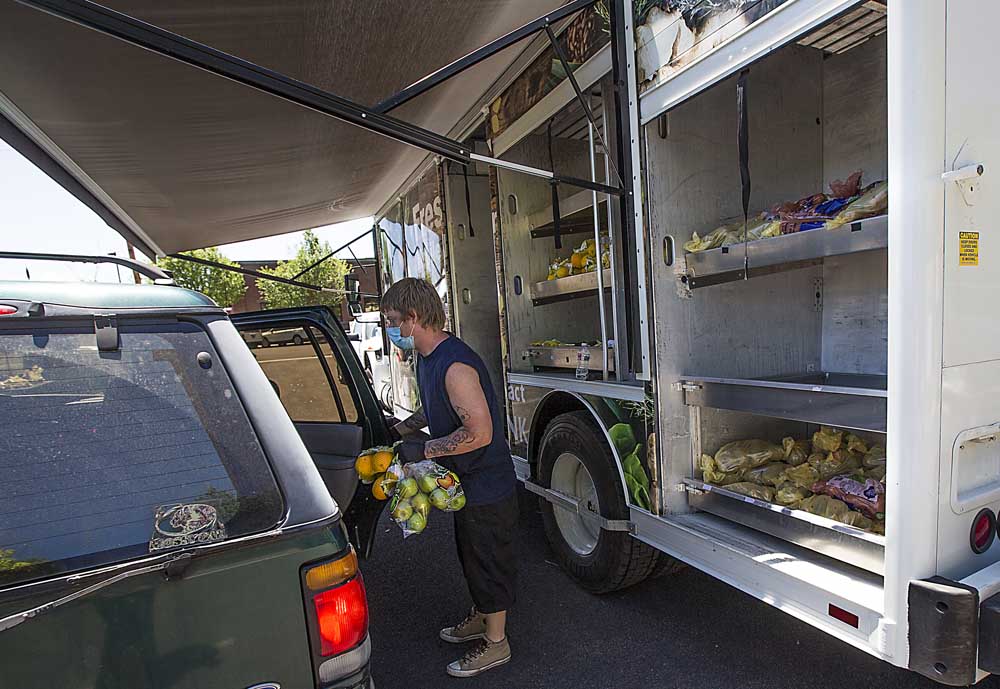Home again
Published 5:00 am Friday, June 29, 2007

- Home again
Call it the summer migration. During the past month, local college students have streamed back from school to spend the summer months living at home with their parents.
The benefits of life with Mom and Dad are fairly evident: You don’t have to wear flip-flops in the shower, dorm food is replaced by home-cooked meals and Mom might even do your laundry.
But returning home also can have its difficulties. College students are accustomed to the freedoms they experienced at school. Living on campus, you can wake up, eat, socialize and go to sleep whenever you want. You might make poor decisions, but they are entirely up to you.
But that mentality doesn’t always jive when you return home to live with Mom and Dad. While your roommate didn’t worry when you crept back into your room at 3 a.m., parents might not be so keen on the idea.
A number of authors, therapists and researchers have tackled this sticky transition. The key, many say, is for parents and returning college students to find a way to form a new relationship and a new dynamic while continuing to respect one another.
The transition
Just last month, Bend residents Kathy and Jim Barrett had the house all to themselves. Now, they are sharing their home with their three grown children as the college students have returned home for the summer. Ryan just graduated from Oregon State University, and twins Megan and Mark just completed their freshman year at OSU. Jim can’t help but notice that the house has changed since the kids returned. There are piles of stuff in the foyer, vehicles fill the driveway, and they have run out of spoons — twice.
Kathy agrees: “I can’t keep enough food in the fridge, and the laundry is going nonstop.”
But more than the physical changes, Jim says he notices other differences.
“When the kids are away, you lighten up a little bit. There is no way to worry about what they are doing tonight,” he said, but now, his “parenting reflex” has kicked back in and he finds himself listening for when they come home each night. Kathy says they have learned to be a little more relaxed in their rules since Ryan began coming home from college a few years back. They tried to enforce more strict rules with him, but realized at some point that it wasn’t working. She and Jim decided to stop asking so many questions, although they do expect to know where the kids are going and when they plan to be home.
“Letting go is a little difficult for everybody,” said Kathy.
For now, the plan is working well and everyone is getting along great. But the siblings have only been back home for little more than a week.
“In August, it might be a different story,” said Kathy.
The Hill family, of Bend, also is adjusting to life now that Spencer has returned from his freshman year at Trinity University in San Antonio. His mom, Sandy, says she is very glad to see him home. She is trying to walk a “fine line” between wanting to ask him lots of questions about his plans and giving him the freedom he experienced in school.
“You know, sometimes I’ll lay awake and worry because I’m a mom,” she said.
Spencer also has had to get used to the transition.
“In college you police yourself; you don’t think about when you’ll be back,” he said. “It’s odd to come back and have parents to answer to.”
Why its different
For the most part, kids are happy to be coming home and parents are excited for their return. But both parties don’t always recognize that a lot has changed.
Natalie Caine, the founder of Empty Nest Support Services, talks to parents about these kinds of transitions every day. She says many parents have a tough time coming to grips with their new roles.
“You can’t parent in the way you used to,” said Caine.
Caine talks with many parents who feel unappreciated. They say their children come home from school, don’t want to talk, leave their stuff around the house and don’t do any chores. These parents, Caine says, feel their kids are “entitled and just visiting.” The parents are bitter and betrayed, thinking “I was your number one, now I’m nobody,” said Caine.
Other parents, she says, feel guilty because they are “really glad to get rid of their kids and are embarrassed to say it.” Caine hears from many parents who say thinks like “I wish my son the best, but we weren’t that close.”
Susan Kuczmarski, author of “The Sacred Flight of the Teenager: A Parent’s Guide to Stepping Back and Letting Go,” says teenagers are “focused on freedom, friends and self” and not as much on family. This is natural as young people try to figure out who they are and what they want out of life, but this idea can be particularly tough for some parents to get used to, according to Kuczmarski.
She believes that teenagers and their parents see their relationship in fundamentally different ways during this time. Parents worry that if they aren’t talking and staying connected with their kids, that the bond between them will become “battered and diminished.” But teenagers often feel that their bond with their parents will always remain strong and isn’t something that needs to be constantly reaffirmed.
Bend father Ric DeMarco has watched three of his children go through the transition from high school to college. He thinks parents “can’t take it personally” when kids distance themselves from their parents.
“We’re wired to separate ourselves from our parents,” said DeMarco. “For the most part, parents have a tendency to be hurt.”
Pitfalls
During this transition phase, parents and students can make some missteps that exacerbate the situation.
Caine says one of the biggest and most common mistakes parents make is asking too many questions. She says this can alienate college students and make them feel as if their parents don’t trust them.
Another big mistake parents make, according to Caine, is basing their plans around their children’s unpredictable schedules. She suggests parents make plans to go out to dinner or spend time with friends and not just wait around the house on the chance that the son or daughter might come home for dinner.
As for curfews, Caine hasn’t heard of any parents who have found a way to make them work.
“They don’t have a curfew in college,” said Caine, so giving them one is just setting the stage for an argument.
Another misstep, according to Kuczmarski, is for parents to wait up for their teenagers to come home.
“It creates a relationship sort of like a prison guard. It doesn’t teach responsibility,” said Kuczmarski.
Parents can also react in the wrong way when it comes to listening, according to Kuczmarski. When the student tells a parent something that they are upset about, maybe a grade or friend, parents should not try to tell them that everything will be OK or try to help them solve the issue, as they might have done when they student was young.
Instead, Kuczmarski says, kids want parents to acknowledge their issues.
“Too many parents don’t validate their feelings,” said Kuczmarski. “Sometimes a teen just wants to express that feeling and get it out.”
Students can also make the situation worse by disrespecting their parents and their house. Some students are also overly critical of their home life and family members. The mentality of some students can set up a difficult dynamic, as Karen Levin Coburn explains in her book “Letting Go: A Parents’ Guide to Understanding the College Years.” She writes: “When students return home, most of them expect to find everything just the way they left it, as though time had stopped while they were gone. They prefer to find their rooms untouched and their siblings and parents just the way they always were. Yet they also want their parents to recognize and respect that they have changed.”
Making it work
Setting appropriate expectations is the key to a smooth transition, according to Kuczmarski. Early on, she believes that parents and teens should talk about setting up new rules of the house. The students should get just as much of a say in establishing these boundaries as the parents do, in order to give them a sense of ownership and equality. If the student suggests that he or she be home or call by 11 p.m., Kuczmarski says, that rule is more likely to be followed than if the parent makes it.
“Boundaries protect each family member’s dignity and sanity,” said Kuczmarski. “Rules are really important.”
She suggests students agree to be quiet when they do come home and that the family members come to a compromise about what the consequences should be if the teens don’t follow the established guidelines.
Kuczmarski also thinks that students home for the summer should take on one or two regular family chores, such as folding laundry or taking out the trash.
“I’m a firm believer that parents can’t do everything,” said Kuczmarski. “They have to understand they have to help out.”
Again, she thinks this works best if the kids are able to decide which chores they will complete.
Teenagers can also help create a better living environment by talking to their parents, helping out around the house and being sensitive to other people’s schedules and situations, according to Kuczmarski.
For mom Sandy Hill, trust has been the key to making the transition work.
“If you trust them to make the right decisions, most likely they will,” she said.
Spencer Hill offers his own tip for parents. When college students say they don’t know when they’ll be home, he says, “it’s not like we’re trying to be vague or difficult,” they really just don’t know.
Inevitably, parents might grow annoyed with something their college students are doing, whether it’s leaving towels on the bathroom floor or listening to loud music. Before addressing this issue, Caine suggests parents take a moment to consider whether it is worth a fight. She thinks parents should “lower your expectations.” When something is really bugging them, parents should just come out and say that.
“Negotiate and keep it light,” said Caine.
DeMarco thinks that most of the troubles parents encounter with the youngsters are tied to the teenage misconception: “You still think your life and your actions are just about you.” The kids don’t realize that their messes or their driving habits have a wider impact. When that happened with his kids, DeMarco says, “It didn’t take long to remind them.”
In dealing with his children through this transition, DeMarco likes to think of holding onto a bar of soap. He doesn’t want to let it go, but if he squeezes too hard, it will shoot out of his hand. Keeping a similarly loose hold on children, he says, “is difficult, but can be accomplished.”
Adult to adult
Some of the changes that students make while away at school help them bond even closer with their parents.
Sandy Hill feels that she and son Spencer are relating to each other more on an “adult to adult” level than they used to. She also feels that his time away at school made him more grateful for little things, like when she does his laundry or makes him a sandwich.
“I knew he was thankful before, but he’s more expressive of it now,” she said.
If students want to be treated as adults, it stands to reason, they need to act like adults. And that means letting parents know about their plans and cleaning up after themselves.
Jim Barrett no longer feels that he can set up firm rules for his children, because they are no longer children.
“Part of you kind of wants to control what they’re doing, but you realize you can’t,” said Barrett. “Eighteen years to have them under your wing is really a pretty short time.”
His daughter Megan sees the changes in herself.
“Living by yourself and having to make your own decisions, I definitely think, in more ways than I even realize, I’ve grown up,” she said.
Barrett thinks he still has some influence over his kids and feels free to offer his opinions and thoughts.
“You try to mother hen them,” he said. Asked if he’ll ever stop doing that, he laughs and says, “Maybe when I’m in a rest home, maybe.”






